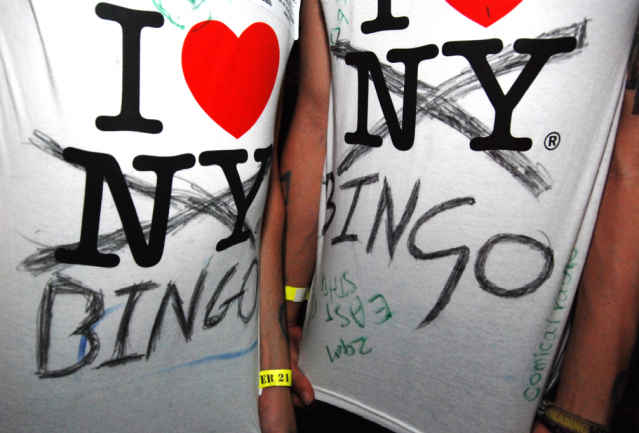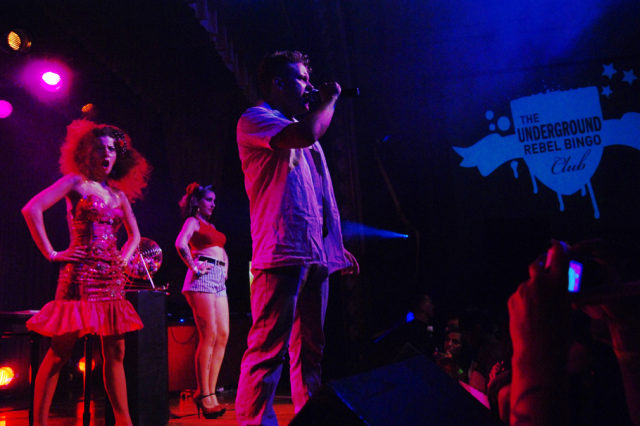Tales from Brooklyn: Short Stories About Love (Actually Sex): Part 10
by T. J. Clarke

“I don’t believe you,” I say.
“Stop being so tortured. There is nothing not to believe,” Nan sighs and says.
I am at the airport in San Francisco, waiting to board my red-eye back to Brooklyn. Everything in California has felt newer, cleaner; the airport waiting area is no exception. The bathrooms here don’t have the distinct, Port-Authority-property smell of citrus and human waste. It is possible to linger in front of the mirrors and straighten my collar and sleeves without feeling like I am about to lose my dinner. Or, to stay in the handicapped stall and have a phone conversation.
“I don’t believe that nothing happened,” I say. I am not proud of the way I fight with Nan; the gaps in my logic are obvious. “You had sex with him once, didn’t you? Well, probably more than once.”
Nan starts to laugh. “Yes, I did. And I came out the winner that time too.”
“Look, you know this isn’t about the sex,” I say. Our conversation has drifted away from the fact I discovered while in San Francisco: Nan’s neglect to inform me that the apartment-and bed-I slept in this past week belongs to Devon’s biological father, and that he and she and Devon spend nearly every summer vacation together, this one included. Her words were, as a family.
“Yes, I know that because there wasn’t any sex,” Nan says and sighs. “I really don’t understand how you could have jumped to that conclusion.”
“I don’t know,” I say archly, my inflection seeming to imply that Nan is the sort of person who will fuck just about anyone. She fucked me, even before we had a first date, didn’t she?
“What is the problem here?” Nan sighs loudly.
“You should have told me.” I push my cause. Although I suppose that I knew, from the way she says his name, Cary, that he is not just a friend, but a special sort of friend. This man is the friend who will remain in Nan’s life when I won’t be there, because we will have had too many fights. “You told Devon about us because you say that he deserves to know my role in your life. I deserve to know what happens in your life too.”
Nan sighs loudly, “no, no, you don’t. I decide what to tell you and how much detail to give. What I tell you and what I tell Devon are governed by completely different rules.” The reception in these bathrooms are remarkably good. I hear everything Nan says, “I was young. I didn’t even tell him about Devon until he was two. I didn’t tell you because this doesn’t concern you. Just as Devon’s being born didn’t concern him.”
“Until it did,” I say. “I slept in his bed.” I slept very well in fact. Devon’s biological father’s bed is nicer than mine.
“So you slept in his bed,” Nan says. She doesn’t sigh this time.
“Wh-”
“Look, what you don’t want to believe is that I like you.” It’s Nan’s turn to explode the fight, throwing emphasis at every syllable. “Except you can’t even say it to my face.”
“No!” I am pacing inside the stall. One after another, the toilets flush, like canons firing. “What I don’t believe. What I don’t understand is why you kept this fact from me if he is such an important part of your life.”
“But he isn’t,” Nan sighs and says. “His sperm made Devon possible. He isn’t involved in anything else anymore except these vacations. He doesn’t pay child support. He leaves me the keys to his apartment so I have a place to stay when I visit San Francisco. He is absolutely nothing to get jealous over.”
“You don’t think he wants you?” I say.
“No, because I don’t want him,” Nan says. There is a pause, our first of the night. “Are you in the restrooms?”
“It seemed like a good idea at the time,” I say.
“How was the bar?” Nan says.
“It was okay,” I sigh and say. “I should go. They might be boarding soon.”
“Okay,” Nan says. “Have a good flight.”
T. J. Clarke is the pen name of a struggling writer. She lives in Brooklyn.
On Preparing For The End Times
Q.: “I’d like to buy enough seeds to grow enough food to survive for 2 years, for 6 people. And then store it.”
A: “The chances that you’ll be able to score the land and security to *grow* food within the first two years of an end-of-the-world type scenario are approximately zilch. Food rarely gets grown in in lawless nations. You’ll be killed right around harvest time.”
No One Wants To Pay For Music
The plight of the music licensing executive: “I actually had a guy that I called the other day,” Baker told me, “and when I asked when he might be sending in his check, he said: ‘I don’t know, why don’t you call Obama? Ask him! He runs everything now.’ So, I put that in my notes, ‘Client referred me to president of United States.’ “ Then there was the colleague of Baker’s who got a letter saying, “Eat you-know-what and die.” When she replied to the client, she got another letter, asking, “What part of eat you-know-what and die don’t you understand?”
When Bad People Make Art About Christ: At Least Mel Gibson Hasn't Stabbed Anyone! Yet!
by Michael Brendan Dougherty

I’ve lost count of how many times Mel Gibson has made a wreck of his life. The rants about Jews, his womanizing, his apparent mentorship of Britney Spears-and then the insane recordings where he pretty much admits to physically abusing his girlfriend. Former would-be censors of his film The Passion of the Christ have told us (rather gleefully) that the full revelation of Gibson’s twisted psyche vindicates their view that his film and memory should be erased from our memory and maybe burned on a pyre.
The idea that the private faults of the artist make their work too impure is of course a nasty religious impulse itself, common in early Calvinism and Islam.
In Frank Rich and Christopher Hitchens, we find a bizarro-world echo of The National Legion of Decency. The masses are too suggestible to view this material! Of course, there were no public orgies after And God Created Woman) just as there were no pogroms in Dubuque after The Passion.
Gibson’s latest troubles come just as the art press is filling up with tributes to Michelangelo Merisi da Caravaggio on the quadricentennial of his death. Gibson cited Caravaggio as a visual influence when he promoted his film. And the painter’s life was more troubled and more scandalous than Gibson’s (at least, so far)-and his depiction of the Passion just as filled with personal demons.
Caravaggio’s masterpiece, The Taking of Christ, was commissioned in 1603 by the Mattei family, then Rome’s richest estate outside the papacy. It was recognized as a classic immediately. Cook up your own breathless art-history descriptions about corruption seizing the innocent, and power destroying goodness. The action in the Garden of Gethsemane is compressed into a closeup, exploding with confusion and violence.
In that last respect it mirrored Caravaggio’s own life. Merisi was a hot mess. Frequently arrested for street fighting in Rome, he was notorious in a notorious city. It’s perfectly reasonable to believe The Taking draws its dark power from those rioting nights. Caravaggio’s friends were likely the models he used.
Three years after composing The Taking of Christ, Caravaggio murdered Ranuccio Tomassoni in one of his brawls, perhaps by accident. He skedaddled to Naples and lived under the protection of another rich family. He fled from patron to patron, hoping to find one with political connections powerful enough to obtain his pardon. Caravaggio was a brawler and a gory murderer, but no one suggests that his work glamorizes rioting, or trying to castrate rivals, or that we should avert our eyes lest we succumb to his same ignominious end.
I don’t mean to suggest that Gibson’s artistic talents are equivalent. The Passion of the Christ fails artistically in several respects where The Taking excels. Gibson’s slow motion scenes fail to invoke the iconography they aspire to become, the piercing of Christ’s side looks cartoonish and the whole thing occasionally feels like a revenge film with the ending cut short. Gibson’s peculiar obsessions are evident in The Passion-his fascination with physical brutality and punishment, his stereotyping.
Still, from Gibson’s faults come many of the film’s merits. Its brutal violence provides a corrective to sappy “My Boyfriend, Jesus” Evangelicalism, while its horrifying and lightning-fast transformation of Palm Sunday’s worshipful crowd into a bloodthirsty mob is an indictment of mass enthusiasms and by extension mega-church piety. Its manly Christ and angry deity speak to God’s justice in a world that presumes on cheap mercy. Roger Ebert praised it for doing away with prayer-card sentimentality.
Something to note: there are no sainted visual artists who could really paint. The Catholic Church commends St. John the Evangelist as the patron saint of artists, because his Gospel paints a heavenly picture. That’s a rather abstract suggestion. Perhaps a truly moving portrait of the price of sin requires someone well acquainted with his own faults. Gibson made his own hands the ones to nail Jesus to the cross. Caravaggio hid himself within the arresting party.
In any case, we should refuse to allow ideological and moral taboos to rob us of Wagner’s music, just as it would be absurd to allow the murder of Tomassoni to make us forget The Taking. In that same spirit, I’ll stand by Gibson’s lesser Passion even as I would join the arrest party ready to apprehend him. Just don’t ask me to defend The Man Without a Face.
Michael Brendan Dougherty is a contributing editor at The American Conservative. He has a new blog. He is trying to sell a book in lieu of a proper job.
Jersey Mayhem: "Braawk! When Are You Going To Clean My Cage? Braawk!"

This is a sad story about the dangers of keeping firearms in the house and drinking alcohol near pets. Dennis Zeglin, 67, of Rudolph, New Jersey has been sentenced to perform 100 hours of community service as a part of Morris County’s pretrial intervention program for first-time offenders after killing his African grey parrot, Mikey with a pellet gun. “Zeglin was intoxicated when he shot Mikey on June 7, 2009 because the parrot distracted him with its squawks as Zeglin watched a NASCAR race on television,” the Asbury Park Press reports, citing Zeglin’s attorney Richard Fletcher. “Zeglin willingly turned over the pellet gun, a Daisy PowerLine Model 93, to police and immediately started intensive counseling for alcoholism, Fletcher has said. He has said his client was extremely remorseful over the death of the parrot, which had been in the household for two decades.”
America Out of Control: The War Against Children's Lemonade Stands

All over America, investigative reporter Evan Fleischer has noted, children’s lemonade stands are being shut down. It’s true! From Haverford Township, PA, to Tulare, CA, even to liberal godless San Francisco, the war on children selling lemonade is in full swing. In Newbury Park, MA, there was a police investigation of a lemonade-vending child, who, cannily, only accepts “donations” instead of a set price. America’s tween and teens: learning how to skirt the Marxist Obama Laws That Are Against Free Enterprise.
Knifecrime Island Fox Hunt Hoax
To Knifecrime Island, where the media is hungry for any kind of sensation: “It was the internet video that sparked a media outcry: grainy footage that seemed to show four masked men drugging a fox and later beating it to death with cricket bats in a London park that was posted on YouTube and Facebook earlier this week. But the Guardian can reveal that the new sport of ‘urban fox hunting’ was an elaborate hoax. The film-makers, Chris Atkins and Johnny Howorth, said no real foxes were harmed in the film, which was intended as a satirical swipe at what they believe is media hysteria over the danger of urban foxes…. The pair said they made their film ‘deliberately Pythonesque’ in a bid to lampoon the media hysteria over urban foxes, and were surprised when the video was so widely assumed to be authentic.”
9/11 Terror Mosque Muslims Have No Money!

Muslim Terror Mosque is going to cost $100 million, roughly the equivalent of a friend-of-the-Bush-family house of Saud airplane fleet or ten terrible social networking startups. Where will this money come from? Nobody knows. Isn’t that suspicious? That a nonprofit would make an application to the city for a building without all the funds in place?
Tonight: The Underground Rebel Bingo Club!
by Josh Duboff

The last time I played bingo, I was sitting cross-legged on my mom’s lap sipping on a Shirley Temple. Some 15 years later, I found myself in a crowd of similarly dressed, fidgety, disaffected New Yorkers. It was nearly midnight on a Friday night last month and we were packed, nearly a thousand of us, in front of the stage at Warsaw at the Polish National Home in Brooklyn. All eyes were on a woman whose hair and face were done up as if she was going as Amy Winehouse for Halloween. She sashayed across the stage, sporting a tummy-bearing sequined red top and small blue-and-white shorts, toward a man dressed more modestly in a white button-down and jeans. The woman, Luki “Danger” Goddi, whispered in the man’s ear, as the crowd-so silent you could hear an iPhone text message alert-watched. Finally our host, James Flames, spoke: “Ladies and gentlemen, the verdict is in. Is Diana here”-he motioned at a girl standing beside him, whose face has turned so pale you would think she was on stage with James Franco-”is Diana here the winner of this gigantic inflatable soccer ball?” There was a dramatic pause “No… no, ladies and gentlemen… she’s not!”

I hollered exuberantly along with everyone else in the crowd. Goddi and her partner-in-crime Anita Baker ushered poor Diana back into the audience. “LOSER!” flashed on the large screen above the stage as the Beck song of the same name blasted over the speakers. The dancing briefly commenced before Flames announced that the next number was about to be called. Diana’s bingo has been invalidated. We are all still in the game.
“People find it really difficult to find things to do if they’re under 30… you know, they’re sick of getting smashed and dancing and drinking. We’re looking to give people something different to do in New York,” Flames said afterward. “The way we do it, it’s… like going to an amazing theatrical event and a heavy metal concert and a massive rave and a house party of your friend-all at the same time.”
Over a year ago, Flames and his buddy Freddie Fortune, both from London, came across a bingo wheel in the basement of a defunct church where they used to throw parties. “We just started playing around with it,” Flames says. “We didn’t really know the rules-it was just kind of our own creation. There’s this adrenaline. There’s something very social about it-everyone doing this weird thing together, surprised to be enjoying it so much.” Flames and Fortune eventually decided to bring their love of the game to the masses. They took the idea to their friends Anita Baker and Goddi, who perform in London as a burlesque duo, who were immediately on board. The Underground Rebel Bingo Club was born.
Whether the appeal comes from its “so dorky it’s hip” quotient (in the same vein as knitting or thick-rimmed glasses) or from the mere fact that it offers an alternative to the typical New York night (starts with an overpriced dinner, moves to a bar with music so loud you can’t hear your friends, ends with pizza and Hulu), this rock and roll bingo has struck a chord. The Club has attracted an increasing number of followers over the past year-both on Facebook and Twitter, and in, you know, real life-at their events throughout Britain.
The Bingo Girls have even become pseudo-celebrities themselves. “You get people every now and then shouting ‘Bingo!’ at you from across the street,” Goddi says of her nascent fame. And now that they’ve conquered England, they’ve-as acts are want to do-set their sights on America. The July 9 Brooklyn show marked their U.S. debut, and they’re back in the city for a second go-round tonight.

The unlikely, flashily monikered foursome has generated enough buzz that they were able to sell out the Brooklyn event even with tickets at $15 apiece; their formula, as Goddi puts it, is “simple and effective.” The “club meeting” begins like any other hipster dance party (“OMG, I love this song,” a girl in a loose green top shouted when Sleigh Bells came on). There were a group of bros eating perogies, which can be purchased at a stand outside the main concert hall. Seven girls were drawing on each others’ backs in a chain (“That isn’t something we ever encouraged or that occurred to us,” Flames said. “People get playful”). There were a group of curly-haired kids-who look like they should be cast as friends with Michael Cera in a teen comedy-muttering to each other and holding their Bingo cards as if they were beers.
But everything comes to a complete halt when the main event begins. Flames lords over the proceedings with an appealing mix of affability, fury and verve. The prizes are amped-up versions of things you’d win at a carnival-a small BBQ, an inflatable piano-but they somehow seem extremely desirable in the moment.
Baker and Goddi read out the numbers pulled from the bingo wheel, all of which they’ve paired with crude rhymes that the girls write themselves. “I have never heard the word ‘pussy’ yelled into a microphone so much in one night,” a 23-year-old attendee Olga said. The crowd follows along studiously, crossing off the numbers with the communal markers, when they aren’t being used to tag each other with vulgarities. Perhaps the most remarkable aspect of all of this-it struck me as everyone oohed and ahhed at the giant inflatable soccer ball Flames held in the air to the thumping DJ beats-was how the crowd, so accustomed to scowling on the subway and avoiding eye contact on the sidewalk, were, well, smiling. This is bingo, after all.

“Sometimes people are so cool-they think, ‘I’m gonna hang back here by the wall.’ You see them a few hours later and they’re drunk out of their minds, screaming to get the prize,” Flames said. Jen Lyon, co-owner of MeanRed Productions, which helped organize the event, compared it to a similar nerd-cultish phenomenon: “People were really excited to go to something different. Just to be a part of the show almost. It reminded me of ‘Rocky Horror’ back in the day.”
After tonight, Flames is mulling embarking on a tour of the west coast. “Las Vegas could be cool,” he said.
Goddi, though, is thinking on an even grander scale. I asked what her least favorite part of her Bingo Girl job is. “That we are not yet at the stage where my entrance is from a giant bingo ball which has just emerged from fiery water at a massive show in Vegas,” she said. “But we will be soon, so it’s fine.”

Tickets can be bought in advance or at the door. They have a website to find out more!
Josh Duboff was waiting on G54. He lives in New York and also writes here.
Laugh Now, But Soon You Will Be Eating This
Yummmmmmmm! “Cloned meat is bound to be unsafe because of genetic degradation — at least so far. We learned that with Dolly the sheep. Lab-grown meat is different in terms of safety; it’s merely tissue that’s been removed from the body of a living animal and maintained outside of that body. It doesn’t require genetic manipulation, merely nutrients and stimuli so the meat will remain viable and increase in mass. And the whole point of growing meat in test tubes is the philosophy of surveillance, so there won’t be viruses or disease-causing entities. If small tumors start to arise, somebody would see it and get rid of that particular culture.”
